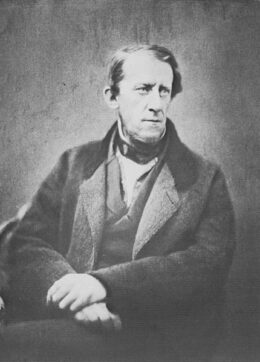
Printed
29 pages
Author(s)
Hansel und Grethel
In this play, Pocci rewrites Hansel and Grethel – a tale by the Brothers Grimm which he first explored in his illustrations. However, this rewriting significantly transforms the original. Here, the two children are not abandoned deliberately by their parents. Pocci portrays the parents’ poverty in a tone reminiscent of the miserabilist and realistic social works of his time. Most importantly, Hansel and Grethel are not kidnapped by a witch but by a cannibalistic naturalist, meaningfully named Fleischmann – from the root “Fleisch” (meat) and an ending commonly found in proper nouns, -mann (man). This absurd meat-eating character allows Pocci to satirise academic pedantry: Professor Doktor Fleischmann revivifies Dottore – a stock character from the Commedia dell’arte. The caricature of the cowardly and litigious court bailiff also contrasts with the honest and simple lumberjack – Peter. Finally, the author adds Kasperl Larifari – the leading light of German puppet theatre – to the cast of characters of the Brothers Grimm’s story.
Poor people are at the mercy of a cannibal
Marianne – the wife of a poor lumberjack – sends her starving children Hansel and Grethel in the woods, so that they pick some berries. But the children are captured by the cannibalistic naturalist Fleischmann, at the same time as the travelling tailor Kasperl Larifari, who believes he will find bed and board at his house. They are locked inside chicken coops and fattened. Kasperl is enraged. To calm him down, Fleischmann allows him outside the cage to drink some wine with him. He intends on eating him right after. But they both get drunk, while the professor’s maid, Katharine, helps the children escape and reports the cannibal to the police. Kasperl takes advantage of the general confusion to escape too. The professor chases him and then gives up. He wants to find the children but falls asleep in the end, exhausted. Kasperl finds him and sews the two legs of his pants together. Eventually, the court bailiff arrives with the children’s father, Peter. When they find Fleischmann, he is unable to move, and Peter kills him with an axe. The children come out of hiding and, at the end of the play, Kasperl declares that wickedness has been punished, virtue rewarded and that they all need to go to an inn now.
Other titles
First performance
Münchner Marionettentheater
Publications and translations
Franz von Pocci: Lustiges Komödienbüchlein, drittes Bändchen, München: J.J. Lentner, 1869, 1-42
